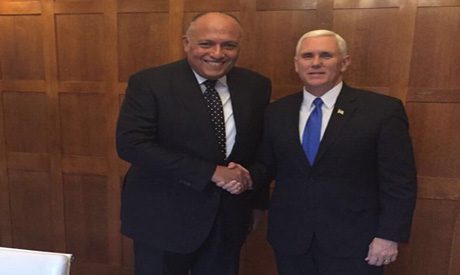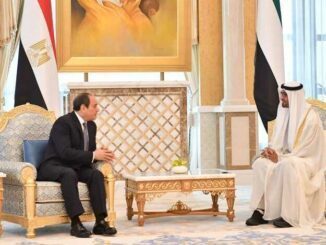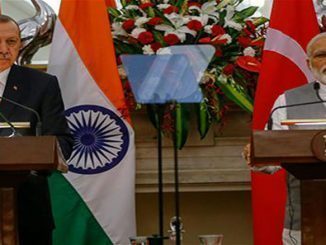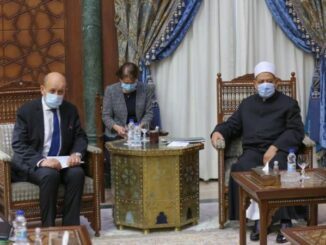
Egypt’s Foreign Minister Sameh Shoukry has recently been in the United States of America on an official visit which is the first of its kind by an Egyptian official following the election of Trump earlier in November. During his visit, Shoukry met with US Secretary of State John Kerry, vice president-elect Mike Pence,whom he handed over a message from Egypt’s Abdel Fattah Al-Sisi to the new US administration under President-elect Trump. Shoukry also held discussions with leaders from the US congress.
In an official statement, Ahmed Abu Zeid, the spokesperson of the Egyptian Ministry of Foreign Affairs, said that the visit aims at strengthening Egypt-US relations and stresses the importance of achieving the Egypt-US common interests, particularly during the coming period. He added that Shoukry’s visit is aimed at sharing Egypt’s visions towards resolving the various regional issues and the recent developments in Syria, Libya, the Palestinian issue and countering terrorism.
In addition, the visit addresses Egypt’s economic challenges and reform program after securing the IMF loan.
First: Shoukry’s meetings in the US
Egypt’s foreign minister’s meetings during his visit to the US have diplomatic, political, military and economic implications.
-Meeting with the transitional US administration:
Sameh Shoukry met first with the US Vice president-elect Mike Pence which is the first meeting between an Arab official and a US official in the new administration after the election of Donald Trump in November.
During the meeting, Sameh Shoukry delivered greetings and a message from Abdel-Fattah al-Sisi to the new US administration, according to the Egyptian foreign ministry statement.
The statement issued by the Egyptian foreign ministry on its official Facebook page stated that al-Sisi’s message to both Pence and US president-elect Donald Trump emphasized the importance of Egyptian-US strategic relations.
Shoukry also confirmed that Egypt was looking forward to working with the new US administration.
The message stressed that the United States can fully depend on Egypt as a partner that supports stability and contributes effectively to solving crises in the Middle East and combating terrorism.
Egypt’s foreign ministry spokesperson Ahmed Abu Zeid also said that Pence listened to Shoukry’s explanation of Cairo’s ongoing economic and social reforms.
The VP-elect said that President-elect Trump was looking forward to working with Egypt and supporting its efforts to enforce peace in the Middle East.
Abu Zeid added that Pence asserted keenness on boosting cooperation with Egypt as a key player to restore stability and peace in the region.
-Meeting with the current US administration:
In the same context, Shoukry met with his US counterpart, John Kerry, at the State Department headquarter, where they discussed the various aspects of bilateral relations, including the US aid program to Egypt.
In addition, Shoukry spoke to the elements of the economic reform program and measures recently taken by the Egyptian government in this front, which display Egypt’s steady strides towards addressing the economic challenges and implementing a comprehensive vision for economic and social development, according to the statement issued by the Ministry of Foreign Affairs.
-Meeting with high-ranking figures in both US houses:
Shoukry also met high-ranking political figures in the Congress and the Senate. Shoukry held a meeting with Senator “Jack Reed” ranking member of the Senate Armed Services Committee.
The meeting focused on regional challenges in the Middle East and the role of the Egyptian army in promoting stability in the region, as stated by the Foreign Ministry’s spokesperson Ahmed Abu Zeid.
He added that Shoukry presented a review of Egypt’s vision of the crises in Libya, Syria, Yemen, and potential solutions, as well as efforts to combat terrorism in the region.
Egypt’s Foreign Minister also met with Sen. Lindsey Graham, Chairman of United States Senate Appropriations Subcommittee on State, Foreign Operations, and Related Programs.
The spokesperson for the Ministry of Foreign Affairs Foreign, Counselor Ahmed Abu Zeid, stated after the meeting that Shoukry’s talks with Senator Graham focused on explaining the economic and political developments in Egypt, including the various components of economic and social reform program.
“Talks also touched upon the Strategic bilateral relations, which require continued US support for Egypt in view of the many political, economic and security challenges,” as stated on Egypt’s Foreign Ministry Facebook Page.
In addition, Shoukry held intensive talks with leaders of the US Congress in both chambers where he met with Senator, “Orrin Hatch,” President pro tempore of the United States Senate, Rep. “Ileana Ros-Lehtinen” Chairwoman of the Subcommittee on the Middle East and North Africa of the Foreign Affairs Committee in the House of Representatives, Rep. “Michael McCaul,” chairman of the House of Representatives Homeland Security Committee and Rep. “Kay Granger,” chairwoman of the House Appropriations Subcommittee on State, Foreign Operations, and Related Programs.
In the same path, Shoukry met with Senator John McCain, chairman of the Senate Armed Services Committee. The meeting focused on discussing the various aspects of the Egypt-US bilateral relations, and on the US aid program to Egypt, both military and economic.
Minister Shoukry briefed the US Senator on the significant efforts undertaken by the Egyptian army in the fight against terrorism in the Sinai and the challenges faced in this context, in addition to the efforts to support stability and peace in the Middle East.
On a similar front, Shoukry met with Representative Ed Royce, Chairman of the House Foreign Affairs Committee.
The meeting witnessed a lengthy discussion about the strategic Egypt-US relations, where Foreign Minister responded to the congressman inquiries about the economic situation in Egypt, the recent law governing the work of NGOs and its impact on the work of American civil society organizations in Egypt, especially since the US law requires spending the aid program and implementing its programs through these organizations.
-Meeting with political research centers close to US decision makers:
Furthermore, Foreign Minister Sameh Shoukry met with former US National Security Advisor “Steve Hadley,” and President of the Board of the US Institute of Peace which is one of the most prestigious research centers and close to the decision-making circles in Washington.
In his meeting with Hadley, Minister Shoukry’s main aim was to negotiate the important report recently prepared by “Hadley” jointly with former US Secretary of State “Madeleine Albright”.
Abu Zeid noted that the report was communicated to the new US administration as a proposal to deal with the region during the next phase, and outlines the strategy to deal with the Middle East, including various recommendations for dealing with the major crises in the region.
Abu Zeid added that Hadley explained the elements addressed in the report, pointing out that it highlights Egypt as one of the most important countries in the Middle East region in terms of strategic value to the United States, and that it is in the US interest to promote and strengthen its relations with Egypt, emphasizing that the report specifies Egypt, Iran, Turkey and Saudi Arabia as the four main countries that the United States could give special attention to when looking to enforce stability in the Middle East.
In addition, Shoukry delivered a keynote on “Egypt in the Middle East” at the 13th Annual forum organized by the Brookings Institute’s “Saban Center for Middle East Policy”. The forum was attended by prominent Middle East officials.
Second: implications of Shoukry’s meetings
The visit’s main stations covered a wide array of subjects that has several implications.
First of all, Shoukry aimed to ensure al-Sisi’s regime readiness to fully cooperate with the new administration.
Also, Shoukry’s visit also concentrated on the latest radical economic reforms implemented by the regime. He also held several talks with the economic aid group in Washington to ensure the importance of the economic aid to his country and to answer their questions after the new NGO’s law that is so much related to the economic aid program. It seems that Egypt fears that the new crackdown on NGOs would affect the flow of US economic aid.
When he was asked about the democratization process in Egypt, Shoukry tried to defend his regime saying that the process of democratic transformation will be achieved but through “a gradual approach that upholds the stability of the society and meets the political, economic and social aspirations of its citizens.”
Also, he emphasized Egypt’s importance in counterterrorism and fighting extremism especially during his meeting with former US National Security Advisor Steve Hadley in the light of the new report that highlights the importance of Egypt’s role in the region.
It seems that Shoukry’s main aim was to highlight how Egypt is important in counterterrorism and in other regional issues hoping that the new administration would give a blind eye to human rights and democratization in the country.
What is the importance of the visit’s timing?
In fact, Sameh Shoukry’s visit to the US at that particular time where a new administration is taking office in the White House infers that both countries would revive their partnership publicly after the cold relation that featured Obama’s administration towards Egypt.
Obama administration and president-elect’s expected policies
After the military coup in 2013 against Egypt’s first democratically elected President Mohamed Morsi, Obama’s policy was cautious towards the Al-Sisi regime.
In the beginning of the military coup in 2013, the Obama administration initially maintained a degree of distance from al-Sisi’s government.
The U.S. froze arms deliveries to Egypt in the aftermath of the 2013 coup, but eventually released aid in March 2015, delivering F-16 fighter jets and tank turrets. Recently, Egypt received in May an initial shipment of 762 mine-resistant, ambush protected (MRAP) vehicles from the United States, which will be used in army operations in North Sinai.
Then Obama administration started to recognize the coup in steady moves under the banner of “fighting terrorism”.
The Time has previously pointed that the change to Obama’s administration toward providing support to al-Sisi regime appeared within the need to “prioritize the immediate needs of the international fight against extremists like ISIS over human rights concerns, embracing an authoritarian regime in Egypt that is battling ISIS-affiliated militants in the Sinai Peninsula and attempting to police a long desert border with Libya, where ISIS managed to establish itself in the chaos of that country’s civil war.”
On the contrary, this wasn’t the case with the new administration as Donald Trump himself didn’t hesitate or find it shameful to praise Egypt’s bloody leader- who killed and imprisoned thousands from Egypt’s political opposition during his electoral campaign.
It is noteworthy that AL-Sisi was one of a few world leaders Trump requested to meet when he was a candidate on the sidelines of the UN General Assembly in September.
In the meeting, Trump expressed to al-Sisi “his strong support for Egypt’s war on terrorism, and how under a Trump administration, the United States of America will be a loyal friend, not simply an ally, that Egypt can count on in the days and years ahead, according to Politico.
Trump then said that if elected president, he will work with Sisi to fight terrorism, describing him in a speech as someone who recognizes that “this ideology of death must be extinguished.”
After the meeting, Trump’s team released an account of his meeting with Sisi that was striking in how much praise the Republican heaped on Egypt.
On the other side, when al-Sisi was asked directly about his opinion on the US elections – during an interview with the CNN after meeting with Trump – and the possibility that Trump would make a strong leader, al-Sisi replied by saying “no doubt”.
Moreover, al-Sisi was among the first World Leader to congratulate Trump to congratulate him on his victory.
In the same context, Sameh Shoukry was the first Arab official to meet US elect official in the new administration which infers how warm will be the relation between both countries.
It is believed that now as Trump has won US presidency, he will probably enhance U.S. support for al-Sisi, who casts his regime as a bulwark against extremist groups which is also one Trump’s first priority.
Will the relation between Al-Sisi and the new US administration get closer?
It seems that the Trump administration will get much closer to al-Sisi regime than the Obama administration. But what would help both parties to get closer?
First, both Trump and al-Sisi share the same views about terrorism and extremism. Trump diagnosed the problem in the Middle East different from his predecessors.
Bush and Obama pushed for political reform in the Arab world while Trump and his closest national security advisors want unconditional support for Muslim autocrats who vowed to change some Islamic principles and to stop violence. “At the top of the list are Abdel Fatah al-Sisi in Egypt and King Abdullah in Jordan, who have both said religious reform is a necessary prelude to defeating jihadism, “said Brooking.
During his campaign, Trump criticized Obama’s administration on his Twitter account” for harping about human rights abuses while Cairo was battling jihadists in Sinai allied with the Islamic State (or ISIS). “
He wrote, “Do you believe that Secy. KERRY just went to Egypt to talk about ‘human rights problems,’” he wrote, “and this as everything is being blown up around him.”
In this context, Foreign Affairs magazine wrote in its article that tilted: “Egypt’s Unlikely Ardor for Trump; Why Cairo welcomes his presidency?” It’s all music to Cairo’s ears. “
“A Trump administration will likely come with none of the human-rights denunciations that its predecessor did, and the prospect of its suspending aid to protest such abuses—as that same predecessor did—has all but evaporated,” said FA.
Rapprochement between Al-Sisi and Russia
Moreover, the second reason for US approach towards Egypt is US commanders concerns over recent outreach between Russia and Egypt.
The Washington Times cited Gen. Joseph Votel, the U.S. Central Command chief saying, “Certainly we have seen outreach to Russia lately,” he added,” I think that is cause for some concern for us … [and] I don’t know if that is particularly helpful to the things we are trying to accomplish in the region.”
Since Camp David Accord, Egypt has been one of Washington’s most stalwart allies in the region for decades, but the relationship began to sour after the crackdown on government dissidents, journalists and others who have criticized Abdel-Fattah al-Sisi’s regime.
During his speech at an event sponsored by the Foreign Policy Initiative, Gen. Votel said that public opposition by Washington and the international community to al-Sisi’s actions may “have pushed [Egypt] into the arms of others, and I think we have to pay attention to that.”
In this context, Gen. Votel said that the American commanders were also looking to restart joint military exercises with Egypt, as a way to stabilize the long-standing military relationship with Cairo. The US General noted, “The military-to-
military relationship, like all relationships, has highs and lows. … I think [Egypt] agrees with that.” “But one thing we are trying to do is get our [joint] exercise program back in place.”
The Washington Times reported that join drills will probably start between Egypt and US. Gen. Votel stated that in recent conversations with senior Egyptian military staff, “we agree that this is something we ought to investigate” how to restart the joint drills.”
In fact, the last time U.S. and Egyptian troops participated in joint exercises was back in the longstanding Operation Bright Star exercises in 2009. In 2011, the next iteration of the exercise was canceled due to the Egyptian revolution on 25 January.



